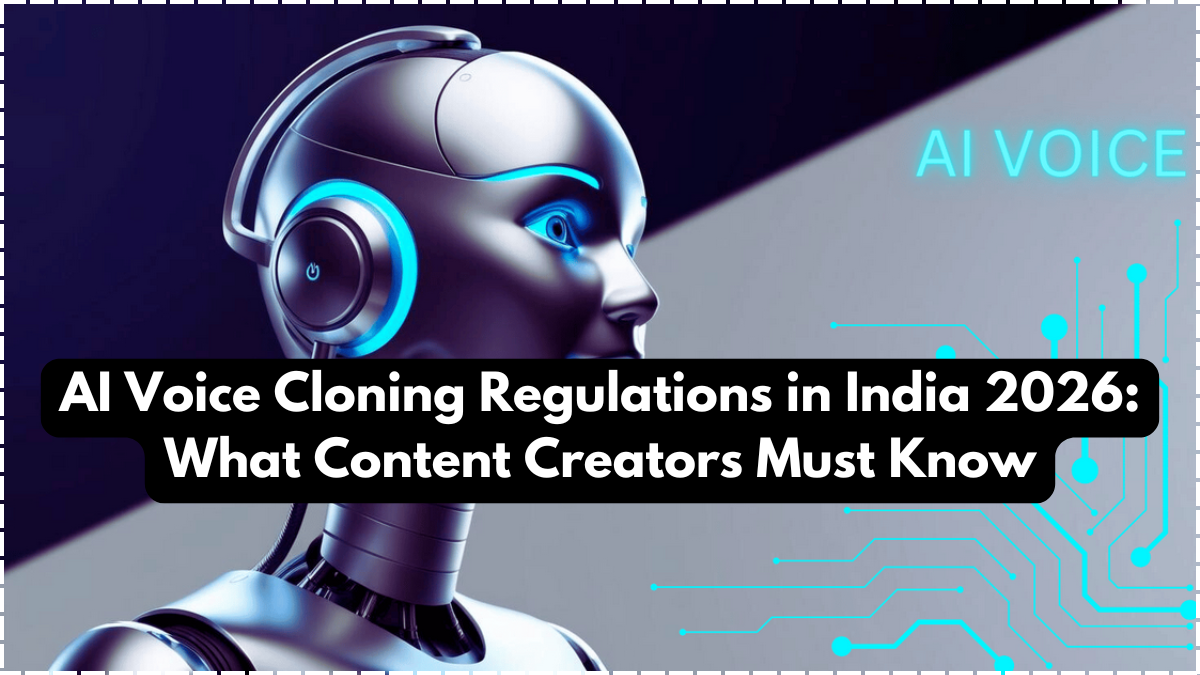The rise of AI Voice Cloning has changed the way creators, brands and digital platforms produce content. By using advanced machine learning tools, creators can now replicate voices, narrate videos and personalize audio at record speed. However, this rapid growth also raises ethical and legal concerns, which is why AI Rules India in 2026 have been strengthened to regulate the use of cloned voices. As misuse cases grow—such as impersonation, fraud and unauthorized celebrity voice cloning—the government has introduced strict guidelines to protect individuals and maintain digital safety. These new rules directly affect content creators, developers and digital businesses who rely on voice-based AI tools.

Why India Needs Stricter AI Voice Cloning Rules
With millions now using AI Voice Cloning tools, the need for strong legal frameworks is more important than ever. Instances of voice fraud, scam calls and unauthorized commercial voice use have pushed authorities to update AI Rules India. Fake voice calls posing as government officials or family members have become a significant concern. Without regulation, voice cloning tools could potentially harm trust in digital communication.
In 2026, the Indian government introduced updated AI safety directives that ensure accountability for creators and developers. These measures require transparency, consent verification and responsible usage of cloned voices. As AI Rules India become more aligned with global standards, content creators must learn to adapt and stay compliant.
Key Provisions Under AI Voice Cloning Regulations 2026
To ensure that AI Voice Cloning technology is used responsibly, several policy updates have been made. These rules emphasize safety, transparency and accountability. The government aims to create a framework where voice cloning can be used for creativity and productivity while preventing misuse. This aligns with the broader agenda of strengthening AI Rules India, especially concerning cyber protection and digital rights.
Below is a table detailing major regulatory changes:
| Regulation Type | Requirement | Who Must Comply | Purpose |
|---|---|---|---|
| Consent Verification | Written or digital consent before cloning anyone’s voice | Creators & AI Developers | Prevent impersonation |
| Mandatory Labeling | AI-generated voice must be disclosed in content | Content Creators | Prevent audience deception |
| Data Storage Rules | Voice samples must be securely stored & encrypted | AI Tool Providers | Prevent unauthorized access |
| Misuse Penalties | Heavy fines for illegal voice cloning | Individuals & Organizations | Prevent fraud |
| Identity Protection | Celebrity & public figures’ voices protected under strict rules | Agencies & Media Houses | Protect digital identity |
These regulations ensure that AI Rules India promote innovation without compromising public safety.
How These Rules Affect Content Creators
For creators using AI Voice Cloning tools for storytelling, video narration or podcast production, the 2026 rules bring several responsibilities. They must now obtain clear consent from voice owners, label cloned audio transparently and avoid using voice replicas for misleading purposes. Compliance with AI Rules India is essential to avoid penalties.
Creators must also keep records of approvals, voice samples and project files to prove authenticity when required. Platforms like YouTube, Instagram and podcast apps are also updating their policies to align with national regulations. This means non-compliant audio can be flagged, demonetized or removed. Following the rules protects creators from legal trouble while maintaining the trust of their audience.
Benefits of Regulating AI Voice Cloning
Although some may view regulations as limits, the revised norms actually support safer innovation. Proper regulation of AI Voice Cloning reduces cybercrime, enhances online trust and promotes ethical AI use. As AI Rules India introduce stronger authentication and transparency norms, audiences can trust that the voices they hear online are real or clearly labeled as AI-generated. This boosts credibility for honest creators and prevents the exploitation of AI technology for harmful purposes.
Additionally, companies can now develop more responsible AI tools, ensuring secure data handling and improved consumer privacy. These safety measures help India emerge as a global leader in ethical AI deployment.
Conclusion
The new regulations for AI Voice Cloning in 2026 show India’s strong commitment to responsible AI innovation. With AI Rules India becoming more structured and protective, creators must learn to work within the guidelines. Ethical voice cloning not only prevents fraud but also enhances digital trust. For content creators, these rules ensure long-term sustainability, audience confidence and creative freedom without legal risks. As AI continues to evolve, staying compliant will be the key to thriving in the future of digital content creation.
FAQ
What is AI Voice Cloning?
AI Voice Cloning is the technology that replicates a person’s voice using machine learning.
Are there legal rules for voice cloning in India?
Yes, updated AI Rules India now require consent, labeling and safe usage of AI-generated voices.
Can creators use celebrity voices?
Only with formal permission. Unauthorized cloning of celebrity voices is illegal.
Are AI-generated voices allowed in monetized content?
Yes, but creators must clearly disclose that the audio is AI-generated.
What happens if someone misuses AI Voice Cloning?
Misuse can lead to heavy fines, legal action and content removal.
Click here to know more.